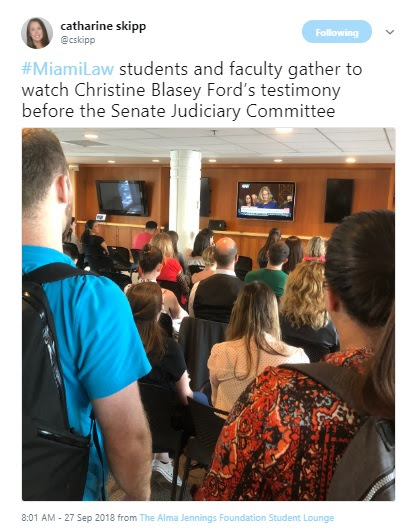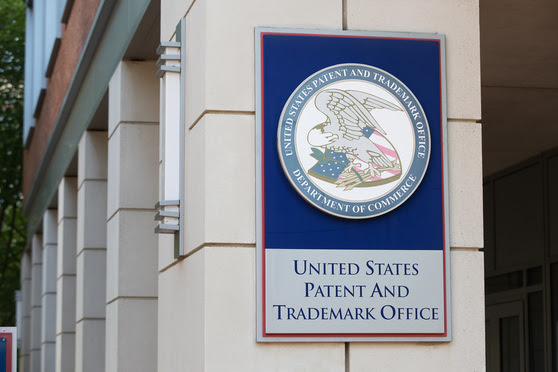Ahead of the Curve: Kavanaugh Hearings Captivate Law Campuses
The Supreme Court nominee's drama has played on law school campuses, including at two schools closely associated with the aspiring justice.
October 02, 2018 at 02:07 PM
7 minute read
Welcome back to Ahead of the Curve. I'm Karen Sloan, legal education editor at Law.com, and I'll be your host for this weekly look at innovation and notable developments in legal education.
This week I'm running down how the Brett Kavanaugh SCOTUS drama has played on law school campuses, including at two places closely associated with the nominee: Yale Law School and Harvard Law School. Next up is a look at a cool program from the Benjamin N. Cardozo School of Law that's helping women entrepreneurs secure patents and launch businesses in hopes of the bridging the patent gender gap. Read on.
Not signed up yet to get Ahead of the Curve sent to your inbox each week? Go here.
Kavanaugh Circus Comes to Campus
Think this is a safe space from the from the Kavanaugh SCOTUS drama? Think again. Like many others, I was transfixed by the testimony Christine Blasey Ford and Brett Kavanaugh on Thursday, as they offered two very different versions of the nominee's behavior as a high school student at a tony Maryland prep school. And so were law students across the country.
My Twitter feed was chock full of law schools posting photos of students gathered in moot court rooms, classrooms and lobbies, staring up at television screens. Law professors offered their takes in real-time on the app. (As my story says, most came down in the camp that Ford was a great witness and a brave one to boot. Many questioned Kavanaugh's decision to come out swinging against Senate Democrats.) It makes sense that law students would be particularly drawn to the hearings, given their interest in the rule of law, the legal system, and the fact that Kavanaugh, if confirmed, will likely influence SCOTUS jurisprudence for decades to come. Local reporters also keyed into that and fanned out to law schools to record student reactions. Perhaps the most interesting was this report in the Harvard Crimson, which says law students actually cheered when Kavanaugh told the Senate Judiciary Committee that he may never be able to teach (or coach youth basketball) because of the accusations of Ford and other women. Recall that Kavanaugh has taught at HLS for a decade as a visiting professor. Some students have called for the school to drop him.
And then there is Kavanaugh's alma mater, Yale Law School, which has been roiledby the accusations against him and questions about what role, if any, the school played in his ascent. Three days before the hearing, students staged a sit-in in New Haven, while others traveled to Washington to oppose his nomination and call for fair treatment of his accusers. The law school was closed to the press Thursday, but according to this report, 70 students gathered in a lounge to watch the proceedings, and the mood was “somber and tense.” The following day, Yale Law dean Heather Gerken issued a statement calling on the committee to delay a vote on Kavanaugh's nomination to allow time for the FBI to investigate Ford's claims, as the American Bar Association did the previous day. Gerken said a delay was in the best interest of the court and the profession.
What did law students on other campuses have to say? Aspiring lawyers at Rutgers Law School found Ford credible, and Kavanaugh less so. “I'm not swayed by it,” said 2L Nakea Barksdale of Kavanaugh's tears. “I think he's honestly crying because this is jeopardizing his career.”
Students at Widener University Delaware Law School convened in a moot courtroom to witness what they called a historic moment, while Suffolk Universitylaw students said Ford's testimony moved them to tears.
There was at least one place where Kavanaugh's name wasn't the main topic of conversation Thursday, even if everyone may have been thinking about him. The UCLA School of Law hosted a Q&A with SCOTUS Justice Elena Kagan and dean Jennifer Mnookin mere hours after the contentious hearing wrapped up. Kagan discussed diversity on the court but avoided questions about Kavanaugh's nomination.
Women Entrepreneurs Get a Law School Boost
Fewer than 8 percent of patents list women as the primary inventor. Let that sink in for a minute.
It's a sobering statistic that Jeanne Curtis, who runs the Cardozo-Google Patent Diversity Project, says should be a wake-up call to the profession and a challenge to law schools to devise ways to help bridge that gender gap.
Last week, the project hosted its inaugural pop-up clinic for women entrepreneurs in New York City, which Curtis believes in the first such event its kind at a law school. It was a partnership with the New York City Small Business Services' Women Entrepreneurs initiative, with a goal of helping clients protect their intellectual property and lunch their businesses.
Fifty women entrepreneurs were paired up with more than 20 volunteer attorneys for one-on-one counseling sessions where they received guidance on matters such as how to register a trademark with the U.S. Patent and Trademark Office, how to research a proposed logo, and how to approach nondisclosure agreements with manufacturers prior to securing a patent. I chatted with Curtis about the event afterward, and she called it a rousing success. It was standing room only in the classroom at Benjamin N. Cardozo School of Law, which held 240 people.
Cardozo launched the patent diversity project last February with funding from Google, with a stated goal of increasing the percentage of women and minority patent holders. I asked Curtis to weigh in on why the numbers are so skewed when it comes to patent holders. She told me it's a multifaceted problem, but here are a few of the culprits:
➤➤Women and minorities are underrepresented in the STEM ranks at the college level.
➤➤Women are less likely to take design and prototyping jobs once they enter the workforce, which are the positions that most often lead to patents.
➤➤Diversity and inclusion challenges in the workplace and other sociological phenomenon contribute to fewer women filing patents.
➤➤Patents are pricey. Legal fees can run up to $20,000, excluding many women and minorities. The Takeaway: Kudos to Curtis and Cardozo for identifying a problem and trying to find a real-world solution. I hope their efforts help women entrepreneurs pursue their projects. But I wanted to know whether Curtis thinks legal education has an obligation to help address the issue. She responded with an unequivocal yes. “I think this is an issue of social justice, like so many others,” she said. “It's an important thing to tackle. I tell people it's not just a question of basic fairness. That's a compelling reason itself. But there are economic reasons as well.” Businesses that hold intellectual property are much more likely to succeed and generally have higher revenue than those that don't, she said.
Extra Credit Reading
The American Bar Association and the U.S. Department of Education duked it out in court last Wednesday over whether the bar group's employees qualify for the Public Service Loan Forgiveness Program. The ABA says yes, but the Education Department disagrees. The parties are awaiting a decision on the ABA's request for a preliminary injunction.
Want to see what the aforementioned Yale law student Kavanaugh protest in Washington looked like? Here's a slideshow PayPal's Chief Legal Officer dropped by the University of California, Berkeley School of Law's Peer 150 General Counsel Institute to share her rules for success. Hint: Rubbing elbows with executives helps.
What does a $1.1 million donation get you at the University of Miami School of Law? Your name on the dean's office.
I'll be back next week with more news and updates on the future of legal education. Until then, keep in touch at [email protected]
This content has been archived. It is available through our partners, LexisNexis® and Bloomberg Law.
To view this content, please continue to their sites.
Not a Lexis Subscriber?
Subscribe Now
Not a Bloomberg Law Subscriber?
Subscribe Now
NOT FOR REPRINT
© 2025 ALM Global, LLC, All Rights Reserved. Request academic re-use from www.copyright.com. All other uses, submit a request to [email protected]. For more information visit Asset & Logo Licensing.
You Might Like
View All



Trending Stories
Who Got The Work
J. Brugh Lower of Gibbons has entered an appearance for industrial equipment supplier Devco Corporation in a pending trademark infringement lawsuit. The suit, accusing the defendant of selling knock-off Graco products, was filed Dec. 18 in New Jersey District Court by Rivkin Radler on behalf of Graco Inc. and Graco Minnesota. The case, assigned to U.S. District Judge Zahid N. Quraishi, is 3:24-cv-11294, Graco Inc. et al v. Devco Corporation.
Who Got The Work
Rebecca Maller-Stein and Kent A. Yalowitz of Arnold & Porter Kaye Scholer have entered their appearances for Hanaco Venture Capital and its executives, Lior Prosor and David Frankel, in a pending securities lawsuit. The action, filed on Dec. 24 in New York Southern District Court by Zell, Aron & Co. on behalf of Goldeneye Advisors, accuses the defendants of negligently and fraudulently managing the plaintiff's $1 million investment. The case, assigned to U.S. District Judge Vernon S. Broderick, is 1:24-cv-09918, Goldeneye Advisors, LLC v. Hanaco Venture Capital, Ltd. et al.
Who Got The Work
Attorneys from A&O Shearman has stepped in as defense counsel for Toronto-Dominion Bank and other defendants in a pending securities class action. The suit, filed Dec. 11 in New York Southern District Court by Bleichmar Fonti & Auld, accuses the defendants of concealing the bank's 'pervasive' deficiencies in regards to its compliance with the Bank Secrecy Act and the quality of its anti-money laundering controls. The case, assigned to U.S. District Judge Arun Subramanian, is 1:24-cv-09445, Gonzalez v. The Toronto-Dominion Bank et al.
Who Got The Work
Crown Castle International, a Pennsylvania company providing shared communications infrastructure, has turned to Luke D. Wolf of Gordon Rees Scully Mansukhani to fend off a pending breach-of-contract lawsuit. The court action, filed Nov. 25 in Michigan Eastern District Court by Hooper Hathaway PC on behalf of The Town Residences LLC, accuses Crown Castle of failing to transfer approximately $30,000 in utility payments from T-Mobile in breach of a roof-top lease and assignment agreement. The case, assigned to U.S. District Judge Susan K. Declercq, is 2:24-cv-13131, The Town Residences LLC v. T-Mobile US, Inc. et al.
Who Got The Work
Wilfred P. Coronato and Daniel M. Schwartz of McCarter & English have stepped in as defense counsel to Electrolux Home Products Inc. in a pending product liability lawsuit. The court action, filed Nov. 26 in New York Eastern District Court by Poulos Lopiccolo PC and Nagel Rice LLP on behalf of David Stern, alleges that the defendant's refrigerators’ drawers and shelving repeatedly break and fall apart within months after purchase. The case, assigned to U.S. District Judge Joan M. Azrack, is 2:24-cv-08204, Stern v. Electrolux Home Products, Inc.
Featured Firms
Law Offices of Gary Martin Hays & Associates, P.C.
(470) 294-1674
Law Offices of Mark E. Salomone
(857) 444-6468
Smith & Hassler
(713) 739-1250










